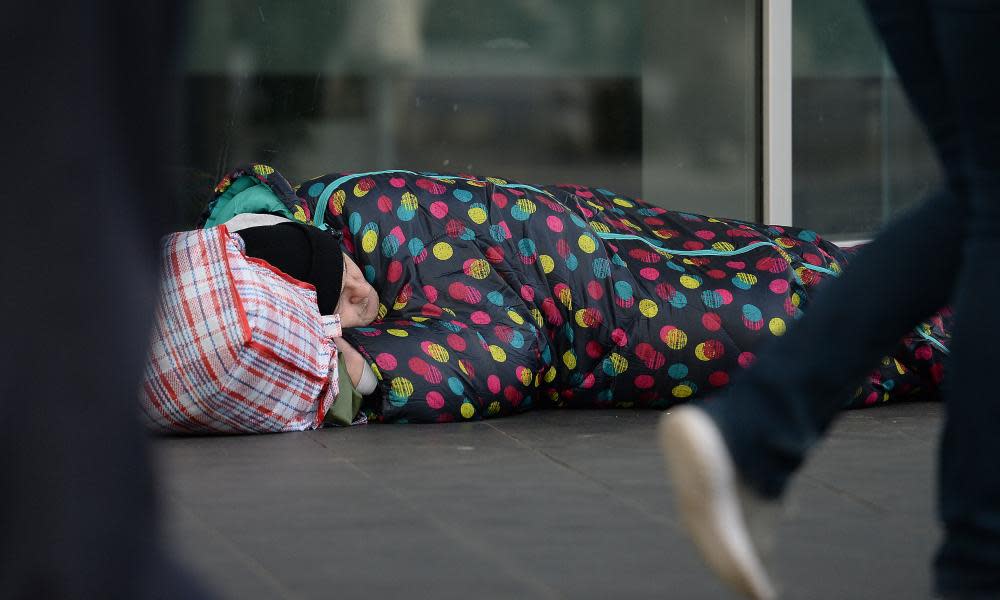Covid restrictions push more under-25s than ever to sleep rough in London, charities say

The number of young people sleeping rough in London has risen to a record high, data shows, as charities say more provision is needed because lockdown restrictions mean those who usually stay off the streets by staying with friends are unable to do so.
According to the Combined Homelessness and Information Network (Chain) thenumber of 16 to 25-year-olds sleeping rough has risen to 368 in 2020 from 250 in the same period last year, an increase of 47%. Young people now make up 11% of the capital’s rough sleepers, a figure charities described as “a historic high”, well above the usually stable 8%.
Two of the capital’s leading youth homelessness charities have warned the London mayor, Sadiq Khan, that the city is ill-equipped to deal with the growth in the number of under-25s sleeping rough.
The charities said they expected further increases now that London has been placed under tier 2 coronavirus restrictions, which effectively make sofa surfing – usually the preferred option for young homeless people - illegal.
Paul Brocklehurst, Centrepoint’s helpline manager, said: “With local lockdowns looming, time is running out to ensure adequate, age-appropriate provision is in place. The mayor needs to refocus his efforts and the resources he has at his disposal to address this rise in young people rough sleeping.”
He said night shelters and homelessness services needed to reflect needs across different age groups.
Phil Kerry, the chief executive of New Horizon who also chairs the sub-group on young rough sleepers of the mayor’s Life Off the Streets Taskforce, said: “Young people are being ignored by the government and in the mayor’s rough sleeping response.
default
“Many more young people who are sleeping rough are coming through our doors but most of the time we can’t find them a safe space to sleep that night. We end up offering them the choice of a sleeping bag or us paying a stay in a shared room with total strangers at a backpacker’s hostel. There must instead be better and safer options.”
The number of young people contacting Centrepoint’s helpline has risen by more than 50% in 2020 compared with previous years.
Josh, 24, from south-west London is supported by New Horizon. “I was made to leave the place I was staying in sad circumstances. During lockdown I was working as a carer but I was sleeping on the streets. It’s been a fight to keep that going. And at night you wait and wait for someone from outreach who say they come to see you and then they don’t. You’re just stuck and unsafe.
“There’s still no shelter or stable housing available also due to peak of homelessness because of the pandemic. It’s hard, to say the least … This system just doesn’t work for young people. There is hardly any temporary accommodation and worst of all, young people are being ignored while also being made vulnerable by the same system.”
The overall number of people recorded as sleeping rough in London between July and September 2020 was 3,444, down by 14% on the same period last year. There were 1,901 people sleeping rough for the first time, an 8% drop compared with 2019.
Lorrita Johnson, the Salvation Army’s director of homelessness services, said it was good to see a general fall, but that “this short-term gain could still lead to a long-term crisis unless the government acts now”.
She said the government’s Everyone In Scheme, which has spent £3.2m spent on getting people off the streets and into accommodation during the pandemic, is only part of the solution because “people need support to overcome the reasons they ended up rough sleeping in the first place”.
“Without sustained support, our experience tells us that these vulnerable people may end up back on the streets,” she said. “In addition to people sleeping rough, this crisis also covers people forced to live in council-funded emergency accommodation like B&Bs. The economic fall out of the pandemic will lead to fewer jobs and greater personal debt which will increase levels of homelessness, leading to more families sharing cramped temporary accommodation.”


